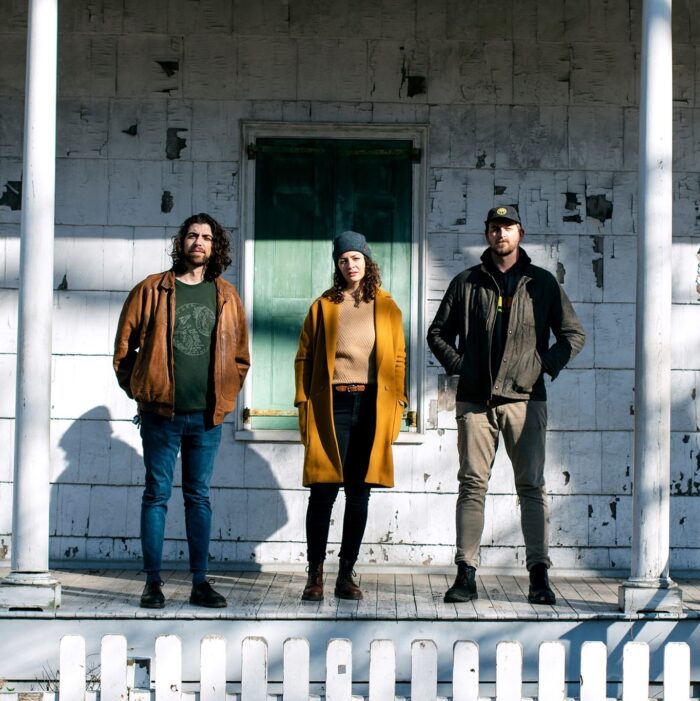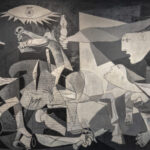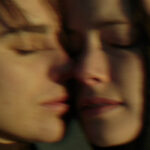Interview: Nervous Dater on ‘Call in the Mess’
Posted: by The Alt Editing Staff

Nervous Dater may be serving up anxiety on their latest record Call in the Mess, but their songs feel more life-affirming than uneasy. On the album, the Brooklyn band concerns themselves with heavy topics both personal and global. They grapple with gender identity and climate change and financial insecurity against a backdrop of science fiction signifiers, tin foil hats and laser eyes and space invaders. But these songs are so energetic and effervescent that they never feel weighed down, bouncing from standard indie rock to surf rock to snotty punk, with a twangy country track thrown in for good measure. The band embodies all of these different personalities with an almost casual assurance, making for one of the most fun records of the year so far.
The band is composed of three songwriters, including guitarist/vocalist Rachel Lightner, bassist Kevin Cunningham, and drummer Andrew Goetz, and their range of disparate influences, from classic rock to folk rock to Weezer, are all ingrained in the band’s DNA. But the band’s willingness to jump into new styles on Call in the Mess didn’t come easy. According to guitarist and vocalist Rachel Lightner and bassist Kevin Cunningham, Nervous Dater’s hard-won confidence is the key to their eclectic and relentlessly re-playable sophomore LP.
“With our first record, we had no idea if people were going to enjoy our music at all,” Lightner said. “Going in with a little bit more confidence in our abilities kind of made this record into what it is.”
That first record, the infectious pop-rock set Don’t Be a Stranger, came out back in 2017, leaving a relatively large gap in between records for Nervous Dater. But the band made the most of their time, touring persistently and working out their new songs in front of audiences and amongst themselves.
“This time, we just had more time in the practice space to work on these songs and make sure structurally and sonically they were how we wanted them,” Cunningham said. Call in the Mess was diligently recorded over six months. Add to that the additional year that the band had to hold back the release due to the pandemic, it’s no surprise to find that they’re relieved to finally have it out there—“We just couldn’t wait any longer,” Lightner said. “We had to get this thing out in the world.”
We spoke to Nervous Dater about how the band has evolved since their first LP and what’s next for them. You can read that below.
You recently released your new record Call in the Mess. How are you feeling now that it’s out there?
Kevin Cunningham: I’m feeling great. I’m so happy that it’s out finally. It took a while but I think we all feel really good about this record. We’ve been listening to it for a while and we’ve been working on it for so long, it’s really nice to have everyone finally listening to it.
Rachel Lightner: I only make a sour face because I feel like I birthed a 29-month-old baby. It’s amazing that it’s out. We kind of had to sit on it for a while and that was so hard. But I’m just so glad it’s out there and our whole three-and-a-half-year streak of not releasing a follow-up album to our debut is broken, so I’m feeling good.
So you had to delay the release because of everything that happened with the pandemic?
Rachel: Yeah. We were hoping—as many people were—that it was not gonna be a whole infinite-long pandemic/lockdown/no-touring situation. Finally, we decided we just couldn’t wait any longer. We had to get this thing out in the world.
How have things changed for you all since the release of your first record?
Rachel: With our first record, we had no idea if people were going to enjoy our music at all. We truly had no gauge except for when we played Brooklyn, people seemed to enjoy hearing us play. So we went into Don’t Be a Stranger with a lot of pressure on ourselves to make something that was accessible and that people would like. With this new record, we had three years of touring and three years of playing shows…we just had a lot more confidence. We took that time to build up our confidence a little as performers and songwriters and just be a little more open with how we approach the recording situation this time around. This was the first time we ever had more than 10 days to record a record. We ended up spending six months recording. We had the ability to make this record in our hometown, in Brooklyn, just on the weekends and after work and it was just a much more relaxing experience. So if we started something and spent two days on it, we could totally scrap it if we felt the urge to start over. We were really rushed with everything else we’ve done—we’ve always recorded out of town in Philly. Relocating the studio and going in with a little bit more confidence in our abilities kind of made this record into what it is.
Kevin: Recording the first record, obviously we were younger and as Rachel said, much less experienced. It was a very pressure-packed 10 days trying desperately to get everything done. This time, we could really let the songs breathe, and we even played some of them live all through 2019 basically. So we had time to feel those songs out live. It just allowed us to make the songs how we wanted to make them.
Did you find that the songs changed significantly over those six months?
Rachel: I think we just got a chance to feel it out. I know when we play a lot of the songs from Don’t Be a Stranger, I change the vocal melodies very often. For one, it’s a little more exciting—the live experience is a little different from the record. But I also get to explore my vocal range a lot more in figuring out ways to expand on these songs and interpret them differently. I think that happened more naturally with this second record—we did give ourselves time to tour on the songs and figure out if the audience was digging it. I know for “Middle Child,” I totally overhauled a second verse and rewrote the melody. These are possibilities within the songs that don’t really open up to you until you’ve played them a dozen or so times live in front of other people.
Kevin: Not just live, but in the practice space too. All three of us write songs alone with an acoustic guitar. When we decide to pursue a song, we work it out together as a band. When you’re going from just an acoustic guitar and a vocal melody to a full-band song, there’s a lot to orchestrate. I feel like for the first record there were a few songs we kind of rushed. This time, we just had more time in the practice space to work on these songs and make sure structurally and sonically they were how we wanted them.
My impression of this record is that it’s a lot more eclectic than the debut. There’s a country-ish song and a surf rock song—it feels like it goes in a lot of different directions. Was it a conscious decision to expand your boundaries a little bit?
Rachel: I don’t think it was conscious. It was just again, going into the studio and being a little more confident in who we were. We weren’t listening back to references constantly. Both Andrew and I are audio engineers and sometimes we overthink things a little bit with references and trying to meet style guides. But with this one we just decided to let the songs live and breathe as they’ll live and breathe. For example, you mentioned “Farm Song” which has this country hook. I tried to Nervous Dater-ify that song so many times, trying to make it like a chugging pop-punk thing and it just was not translating. And I brought it to the guys and said, “okay, just hear me out, what if we made this like a country-ish song?” I asked our drummer Andrew to play like a farm beat. And it just added some variety that we haven’t had yet—I think that we all wrote really unique songs. We have three songwriters in the band and we all have way different influences.
Kevin: “Farm Song” is a great example of all the stuff we’ve been talking about. It certainly had that countryish vibe long before we had the slide guitar, but we had most of it done and we were just in the studio thinking something is missing, we need something to kind of tie this whole thing together. And our producer Lorenzo Wolff had a slide guitar there along with a whole assortment of instruments that we made very good use of. And he kind of played something quickly and we said “yes, try and do a take of that and let’s see what happens.” And he literally did maybe one or two takes of playing that slide guitar for that song and I think it really does tie the whole song together.
The record feels spontaneous and a little looser than the last one.
Rachel: Loosey-goosey! Absolutely. We said that many times in the studio. “Keep it loosey-goosey.”
Kevin: We also did the drums and bass live together, which I think adds to the spontaneous nature of it.
Rachel: It’s more natural than playing to a click for me. People who see us live always say we’re “so fun.” And I love that so much, it’s also something I just really appreciate about our band. So we wanted this album to easily translate to a live performance experience and that kind of fun feeling. It’s not as buttoned up as other records and not as polished because that’s not our vibe.
Kevin: “Nervous Dater: Not Polished” is kind of a good band tagline.
You mentioned that you all have different influences as songwriters, can you talk a little bit about what those influences are?
Rachel: I definitely started writing songs more in the singer-songwriter realm, and that has been pretty consistent throughout Nervous Dater. I love folk music and that’s kind of where I started. I was in a band with our original guitarist Yon Heenan—we had a folk band in college and we basically sounded like The Decemberists. That genre has always been extremely personal to me—I absolutely love Joni Mitchell and Damien Rice. But at the same time, my favorite band of all time is Weezer. In middle school, I printed out a bunch of pictures of Rivers Cuomo and made a collage of pictures of Weezer with their lyrics and laminated it and put it in the front of my middle school binder that I carried around from class to class. I picked up guitar because of Weezer, but learned how to write in the folk context.
Kevin: When I was a kid first starting to play guitar, like 10 years old, I was listening to classic rock. I had no influences in my life listening to anything other than what was on the radio. And then at 11 or 12, somehow I started listening to Nirvana. That kind of totally opened up my life to a whole other world of music. And it also made me immediately stop trying to be a good guitar player. I learned power chords and all I wanted to do was write songs. I didn’t care if I played tasty licks like Jimmy Page, I just wanted to write songs. The three of us do share a lot of influences, especially contemporary ones. Like Hop Along is a huge one for us. All of our friends and contemporaries too—Hit Like a Girl, The Obsessives, Weakened Friends, Good Looking Friends. There’s just so much good music right now in this scene we all live in, this small niche of the music world, we can get inspiration from every show we play.
Lyrically, what kind of mindset were you in when you wrote these songs?
Kevin: My songs are a little more outward-looking this time. I wrote “Violent Haiku” and “Turn Them Ourselves in The Grave” about around the same period two years ago. They were definitely both inspired by something I think probably a lot of people can relate to—just a daily cycle of outrage that we’ve experienced, certainly over the last four years, but really all of our lives as we’ve watched ourselves knowingly and willingly destroy the planet we live on. “Turn Them Ourselves” is specifically about that and just being in the moment of, whether it’s late at night scrolling on your phone or watching the news during the day, when you can just get so worked up about the cynical corrupt people in power and what they’re doing to our country and our world.
Rachel: A lot of this record was written right as Trump was elected. I was also laid off from my job right around the same time and I was just in this deep downward spiral of depression and watching way too much news. So that’s actually where the album art really resonated with me—that picture from Kay Dargan, of her sitting on the couch watching TV with the laser eyes. “Middle Child” is very much about that, about the depression spiral of feeling so out of control because you feel like the government is just absolutely failing you and humanity seems hopeless. There’s also a lot of talk of gender identity from me on this record. I think I felt safer to talk about it and try to put into words what I was feeling as I transitioned to identifying as nonbinary. That sense of feeling freed and validated and heard. But also this terrifying sense of what do I do now? Will people judge me if I don’t change my pronouns? How do I present myself? How do I encounter work situations where I’m misgendered or someone says something insensitive about gender? How do I tackle this from this new identity standpoint that I have kind of sought comfort in. But also, other themes are kind of the usual—anxiety and depression—that you get from a Nervous Dater song. I lost my job right before we started recording this record, so there’s a lot of talk on this record about debt and financial insecurity and how that affected my personal mental health.
The record has kind of an X-Files motif with references to sci-fi and conspiracy theories (“Tin Foil Hat,” “Red String Map,” “Turn Them Ourselves in Our Graves,” etc). What do these references mean to you? How do you interpret them?
Rachel: A lot of this album is just about frustrations with the world and everything. The world has felt so apocalyptic. We just heard “Tin Foil Hat,” which our drummer Andrew wrote, and we were like, this is fucking sick. We’re all very much into the sci-fi aliens thing. We listen to Coast to Coast AM while we’re in the van on tour and there’s a sample of that radio program on “Tin Foil Hat.” When we were talking to Kay, the album artist, we knew that she loves Goosebumps vibes, and I don’t know, it just felt right. This record feels a little grim. I know some of the themes we’re touching on are extremely personal and specific, but at the same time there’s just this overarching anxiety of what the fuck is this planet going to be in x number of years. Whether it’s from the standpoint of the government or what will the climate situation be. It kind of felt right to assign it this kind of extraterrestrial, paranoid, anxious vibe.
What are you looking forward to as a band?
Rachel: LP3! We have vowed to never sit on a record for this long ever again. Although I think it proved itself to be fruitful and in our best interest to sit this long on a record, we are ready now to get back at it. We’re sending demos. I just personally want to play music together and we haven’t been able to do that. We played our last show together a year ago today actually. The only time we’ve gotten to play music since then was for our music video shoot that we did outside in 35 degree weather.
Kevin: Fake playing together! Occasionally, during a very busy time, band practice can kind of feel like a chore. But it certainly will not feel like a chore when we are finally doing it again, sooner rather than later hopefully.
Rachel: I think this whole thing just made us appreciate our time together. Whether it’s practicing in the van or playing shows. Yeah so I think that’s what we’re most looking forward to—figuring out a safe practice situation and hopefully starting to demo some things out. Because I know I’m raring to go, I’m ready.
Call in the Mess is out now on Counter Intuitive Records.
–
Jordan Walsh | @jordalsh
The Alternative is ad-free and 100% supported by our readers. If you’d like to help us produce more content and promote more great new music, please consider donating to our Patreon page, which also allows you to receive sweet perks like free albums and The Alternative merch.










